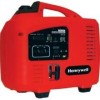Honeywell HW2000i Owners Manual - Page 12
Grounding the Generator, Using Generator for Back-up Power, Special Requirements - manual
 |
UPC - 894190002193
View all Honeywell HW2000i manuals
Add to My Manuals
Save this manual to your list of manuals |
Page 12 highlights
Grounding the Generator Grounding the Generator Grounding the Generator WARNING Generator must be grounded to prevent electrical shock from faulty appliances. • Before using generator, consult a qualified electrician, electrical inspector, or local agency having jurisdiction for local codes or ordinances that apply to the intended use of generator. The National Electric Code requires the generator to be connected to an earth ground. Before using the generator, connect a copper wire (minimum 14 AWG) from the ground terminal (see Figure 4) to an earth ground. Consult a licensed electrician for proper grounding methods. Using Generator for Back-up Power DANGER Before connecting to a building's electrical system, consult your local utility company or a qualified electrician. Improper connections to a building's electrical system can be deadly. Electrical current from generator can feedback into utility lines. Such feedback may electrocute utility company workers or others who contact utility lines during a power outage. Electrical current can feedback into generator. When utility power is restored, generator may explode, burn, or cause fires in building's electrical system. The National Electric Code requires any generator connected to a building's electrical wiring utilize a transfer switch installed by a licensed electrician. What is a transfer switch? A transfer switch is a device that allows switching from utility power to emergency generator power. The transfer switch is either a manual switch, an automatic switch, or a combination of manual and automatic. During a power outage, the transfer switch isolates emergency circuits from the utility line, allowing for efficient operation of the generator without back-feeding into utility power. FIGURE 4: Ground Terminal (HW2000i model illustrated) NOTE: The system ground is not connected to the AC neutral wire. If using a receptacle tester, it will not show the same ground circuit condition as for a home receptacle. Special Requirements There may be Federal or State Occupational Safety and Health Administration (OSHA) regulations, local codes, or ordinances that apply to the intended use of generator. Please consult a qualified electrician, electrical inspector, or the local agency having jurisdiction. • In some areas, generators are required to be registered with local utility companies. • If generator is used at a construction site, there may be additional regulations which must be observed. 6 www.honeywellgenerators.com HW1000i / HW2000i Inverter Generator Owner's Manual















